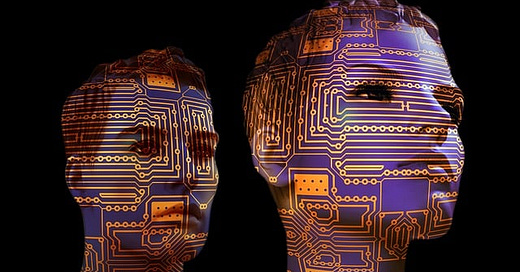My Recent Guest
My latest guest on Brave New World was Alex Wiltschko, CEO of the smell company Osmo.ai. This was Alex’s second appearance on the podcast. I’ve been studying olfaction myself for the last few years with my Data Science PhD student Vivek Agarwal and neuroscientist colleague Dmitry Rinberg at the NYU Medical Center. One of our goals is to use the neural signatures we observe in genetically engineered mice that are exposed to odorants for purposes such as disease detection.
We don’t think about it, but smell plays a huge role in our lives, especially in our health and overall well-being. We learn to recognize when something doesn’t smell right.
Alex’s work has been driven by a singular question: what’s the correlation between molecular structure and smell? And what does AI bring to the table in understanding smell?
I’m a fan of Alex and admire how he is taking smell to the marketplace by developing real products. I smell a smell disruption coming, but you tell me after listening to episode. Osmo has made computers capable of reading and writing smell. For example, you can write a description of an odor, such as “early morning in a lavender field in Provence,” from which the machine creates the smell for you using a small set of molecules. But what blows my mind is the ability to capture a sample of a desired odorant in a container and to get the machine to create that smell. It is also interesting that Osmo can create a new molecule that will have a desired smell.
I can imagine that people, especially those with a brand, would want to create their unique “olfactory signatures” as logos. I’d love to create one myself. Osmo.ai brings such a capability to the masses for the first time. The smell space is very promising in terms of applications in areas such as healthcare, security, food, and pleasure. Incidentally, if you have not read the book Perfume by Patrick Susskind, you should. It’s a fascinating, albeit somewhat dark story with a protagonist who has an uncanny sense of smell which he uses for pure evil, but I digress.
Check out my conversation with Alex at:
https://bravenewpodcast.com/episodes/2025/07/10/episode-97-alex-wiltschko-on-digitizing-scent/
Is AI Beginning to Acquire Some Rights?
We may not realize it, but we are quietly moving towards a brave new world in which AI is acquiring some unalienable rights: to learn from us without our permission.
On June 23, 2025, a District Court judge in California, William Alsup, passed a ruling on a class action suit filed by writers Andrea Bartz, Charles Graeber and Kirk Wallace Johnson against the AI company Anthropic for training its models on their books without permission. The Copyright owners contend that AI companies are unlawfully copying their work to generate competing content that threatens their livelihoods.
Anthropic’s defense was that training its LLMs based on copyrighted material is “exceedingly transformative,” and constitutes fair use under current copyright law.
Judge Alsup sided with Anthropic, saying that legally acquired content to train AI models constitutes fair use. In his assessment, Alsup invoked an analogy that is fraught with problems and could become the basis for an appeal by the plaintiffs. Alsup said that “the authors’ lawsuit is no different than it would be if they complained that training schoolchildren to write well would result in an explosion of competing works.”
Does It Smell Right?
The ruling is a big win for AI innovation in that it removes a major piece of uncertainty around training data for LLMs. It bolsters the default model used by AI companies over the last decade, to make expansive use of data without permission and deal with the consequences later. This strategy has worked well so far.
But the analogy to the human child could open a can of worms.
A child learns painstakingly and the knowledge acquired is not in the public domain, which does not threaten the creator in any way. Furthermore, there is little chance of a child being able to combine the style and content of multiple authors to create derivative works without a lot of effort and creativity, let alone sell such content for profit. An AI has no such barriers.
Borrowing from Geoff Hinton, perhaps a better analogy would be to consider the AI as an alien instead of a child. Suppose that the alien acquired the knowledge and learning ability of the best LLM that would enable it to learn everything from the collective expression of humanity on the Internet. It would acquire the ability to write like anyone and to easily combine writing styles and content of existing authors to create novel content, the quality of which could well surpass human creativity.
Would the decision based on the child analogy still hold? I would be surprised. A child, or even the most capable adult for that matter, has limited cognitive ability and memory relative to the alien. Would we be comfortable arguing that the alien’s unbridled use of everyone’s knowledge, especially for profit, constitutes fair use? It’s a stretch. And unfair to the copyright holder.
So, is there a solution? I would argue that the option of letting the AI learn from copyright data should rest with the holder of those rights. One efficient solution could be for content to be opt-in by default, and require copyright holders to expressly opt-out of their content being used as training data for the AI. The compliance burden would rest with the author or publisher, but it would provide authors with control over how their content is used by the AI.
ChatGPT concurs. It suggests Opt-out registries for authors who don’t want their work used.
However, this solution does not solve an equally vexing problem, namely, of ensuring that derivative works of the original content are analyzed for infringement, especially if such works are used for profit. Given the sheer volume of such content, this isn’t a problem that can be addressed by humans. Ironically, it will require an AI solution. It reminds me of an observation by my colleague Yann Lecun, that dealing with problems created by AI requires more AI, not less.
What a bizarro brave new world of AI.
Click below to pre-order my forthcoming book, Thinking With Machines. It has a whole chapter in AI Rights.






Looking forward to reading your book!